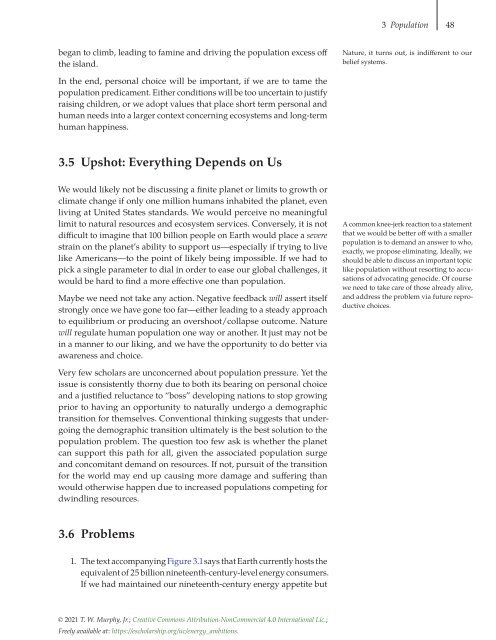Energy and Human Ambitions on a Finite Planet, 2021a
Energy and Human Ambitions on a Finite Planet, 2021a
Energy and Human Ambitions on a Finite Planet, 2021a
You also want an ePaper? Increase the reach of your titles
YUMPU automatically turns print PDFs into web optimized ePapers that Google loves.
3 Populati<strong>on</strong> 48<br />
began to climb, leading to famine <str<strong>on</strong>g>and</str<strong>on</strong>g> driving the populati<strong>on</strong> excess off<br />
the isl<str<strong>on</strong>g>and</str<strong>on</strong>g>.<br />
Nature, it turns out, is indifferent to our<br />
belief systems.<br />
In the end, pers<strong>on</strong>al choice will be important, if we are to tame the<br />
populati<strong>on</strong> predicament. Either c<strong>on</strong>diti<strong>on</strong>s will be too uncertain to justify<br />
raising children, or we adopt values that place short term pers<strong>on</strong>al <str<strong>on</strong>g>and</str<strong>on</strong>g><br />
human needs into a larger c<strong>on</strong>text c<strong>on</strong>cerning ecosystems <str<strong>on</strong>g>and</str<strong>on</strong>g> l<strong>on</strong>g-term<br />
human happiness.<br />
3.5 Upshot: Everything Depends <strong>on</strong> Us<br />
We would likely not be discussing a finite planet or limits to growth or<br />
climate change if <strong>on</strong>ly <strong>on</strong>e milli<strong>on</strong> humans inhabited the planet, even<br />
living at United States st<str<strong>on</strong>g>and</str<strong>on</strong>g>ards. We would perceive no meaningful<br />
limit to natural resources <str<strong>on</strong>g>and</str<strong>on</strong>g> ecosystem services. C<strong>on</strong>versely, it is not<br />
difficult to imagine that 100 billi<strong>on</strong> people <strong>on</strong> Earth would place a severe<br />
strain <strong>on</strong> the planet’s ability to support us—especially if trying to live<br />
like Americans—to the point of likely being impossible. If we had to<br />
pick a single parameter to dial in order to ease our global challenges, it<br />
would be hard to find a more effective <strong>on</strong>e than populati<strong>on</strong>.<br />
Maybe we need not take any acti<strong>on</strong>. Negative feedback will assert itself<br />
str<strong>on</strong>gly <strong>on</strong>ce we have g<strong>on</strong>e too far—either leading to a steady approach<br />
to equilibrium or producing an overshoot/collapse outcome. Nature<br />
will regulate human populati<strong>on</strong> <strong>on</strong>e way or another. It just may not be<br />
in a manner to our liking, <str<strong>on</strong>g>and</str<strong>on</strong>g> we have the opportunity to do better via<br />
awareness <str<strong>on</strong>g>and</str<strong>on</strong>g> choice.<br />
A comm<strong>on</strong> knee-jerk reacti<strong>on</strong> to a statement<br />
that we would be better off with a smaller<br />
populati<strong>on</strong> is to dem<str<strong>on</strong>g>and</str<strong>on</strong>g> an answer to who,<br />
exactly, we propose eliminating. Ideally, we<br />
should be able to discuss an important topic<br />
like populati<strong>on</strong> without resorting to accusati<strong>on</strong>s<br />
of advocating genocide. Of course<br />
we need to take care of those already alive,<br />
<str<strong>on</strong>g>and</str<strong>on</strong>g> address the problem via future reproductive<br />
choices.<br />
Very few scholars are unc<strong>on</strong>cerned about populati<strong>on</strong> pressure. Yet the<br />
issue is c<strong>on</strong>sistently thorny due to both its bearing <strong>on</strong> pers<strong>on</strong>al choice<br />
<str<strong>on</strong>g>and</str<strong>on</strong>g> a justified reluctance to “boss” developing nati<strong>on</strong>s to stop growing<br />
prior to having an opportunity to naturally undergo a demographic<br />
transiti<strong>on</strong> for themselves. C<strong>on</strong>venti<strong>on</strong>al thinking suggests that undergoing<br />
the demographic transiti<strong>on</strong> ultimately is the best soluti<strong>on</strong> to the<br />
populati<strong>on</strong> problem. The questi<strong>on</strong> too few ask is whether the planet<br />
can support this path for all, given the associated populati<strong>on</strong> surge<br />
<str<strong>on</strong>g>and</str<strong>on</strong>g> c<strong>on</strong>comitant dem<str<strong>on</strong>g>and</str<strong>on</strong>g> <strong>on</strong> resources. If not, pursuit of the transiti<strong>on</strong><br />
for the world may end up causing more damage <str<strong>on</strong>g>and</str<strong>on</strong>g> suffering than<br />
would otherwise happen due to increased populati<strong>on</strong>s competing for<br />
dwindling resources.<br />
3.6 Problems<br />
1. The text accompanying Figure 3.1 says that Earth currently hosts the<br />
equivalent of 25 billi<strong>on</strong> nineteenth-century-level energy c<strong>on</strong>sumers.<br />
If we had maintained our nineteenth-century energy appetite but<br />
© 2021 T. W. Murphy, Jr.; Creative Comm<strong>on</strong>s Attributi<strong>on</strong>-N<strong>on</strong>Commercial 4.0 Internati<strong>on</strong>al Lic.;<br />
Freely available at: https://escholarship.org/uc/energy_ambiti<strong>on</strong>s.


















